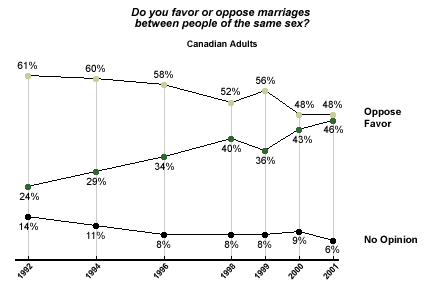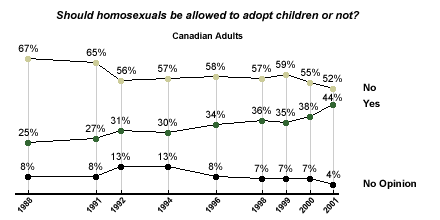Popular talk-show host and adoptive mom Rosie O'Donnell's recent public discussion of her same-sex relationship has again propelled the topics of same-sex marriage and same-sex parenting into the public consciousness. Nickelodeon, a children's television network, received more than 100,000 messages of protest when it aired a documentary on same-sex parenting. Despite Nickelodeon's claim that its aim was to instill tolerance by educating children on the topic of same-sex relationships and same-sex parenting, many viewed the program as an attempt to indoctrinate young minds to the acceptability of homosexual lifestyles.
In general, however, Gallup data indicate that North Americans have become considerably more accepting of same-sex relationships in recent years. In 1999*, 61% of American adults believed marriages between homosexuals should not be recognized as legally valid. In 2002, disapproval of the legalization of same-sex marriages dropped to 51%. A similar trend has occurred in Canada. The number of Canadian adults who would favor same-sex marriages has almost doubled in a nine-year span: from 24% in 1992 to 46% in 2001**.
Same-Sex Marriage and Adoption
International and domestic laws regarding same-sex marriages and adoption vary widely. In 1989, Denmark became the first country to allow same-sex marriages; since then, Norway and Sweden have followed suit. This month, Sweden also passed a law granting homosexual couples the same rights as heterosexual couples in adopting children. The laws in Canada and the United States are more restrictive. While Canadian law does not allow same-sex couples to marry, more than half of Canadian provinces now allow gay and lesbian couples to adopt children. In 2000, Vermont became the first U.S. state to recognize same-sex civil unions, granting homosexual couples many of the other rights and benefits that heterosexual couples enjoy.
Americans and Canadians hold similar views when considering the question of whether same-sex marriages should be granted legal status. In May 2002***, Americans were almost evenly divided on a law that would allow homosexual couples to legally form civil unions, giving them some of the legal rights that married couples possess. Forty-six percent favored such a law, while 51% opposed it.
Canadians share views similar to those of their American counterparts. Forty-six percent of Canadian adults polled in 2001 favored marriages between people of the same sex; a similar number (48%) were opposed.

Canadians' attitudes toward homosexuals adopting children are only slightly less positive than their attitudes toward same-sex marriages. In 2001, 44% believed that homosexuals should be allowed to adopt children, while a slight majority (52%) said they would deny adoption rights to homosexuals. Since 1988, when Gallup first asked this question in Canada, there has been a steady increase in the number of Canadians who believe homosexuals should be allowed to adopt children. Predictably, younger Canadians are more accepting of homosexuals adopting children: those aged 18 to 29 are more than twice as likely than those aged 65 and older to support the idea of homosexuals adopting children.

*Results are based on telephone interviews with 1,054 U.S. adults, aged 18 and older, conducted Feb. 8-9, 1999. For results based on the total sample, one can say with 95% confidence that the maximum margin of sampling error is ±3%.
**Results are based on 1,001 telephone interviews with Canadian adults, aged 18 and older, conducted Feb. 12-18, 2001. For results based on the total sample, one can say with 95% confidence that the maximum margin of sampling error is ±3%.
***Results are based on telephone interviews with 1,012 U.S. adults, aged 18 and older, conducted May 6-9, 2002. For results based on the total sample, one can say with 95% confidence that the maximum margin of sampling error is ±3%.
